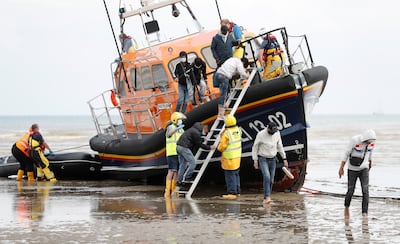More than 10,000 migrants have made the life-threatening journey across the English Channel from France this year, far more than the estimated 8,500 people who arrived in all of 2020.
On Wednesday, more than 458 people made the crossing to the UK, the highest daily total yet.
That number – confirmed by the UK Home Office on Thursday morning – surpasses the previous daily high of 430 set on July 19, 2021.
Home Secretary Priti Patel and her department have repeatedly vowed to make the Channel route unviable, but crossings of the Channel – which is 53 kilometres wide at its narrowest point – continue without pause.
This week, Ms Patel met members of the Greek government during a two-day trip to discuss “shared challenges on illegal migration” before going out on patrol with the country's coastguard.
Last month, she announced a multimillion-pound funding package to help France improve security on its side of the Channel to stop people using its beaches as departure points for southern England.
On Wednesday at least 40 people were seen disembarking from a British lifeboat on Dungeness Beach in Kent after recent bad weather cleared and allowed small boat crossings to resume.
Last week, the Royal National Lifeboats Institution (RNLI) was dragged into a row about helping migrants and criticised as being a “migrant taxi service” for rescuing people who attempted the journey. The volunteer service said it had a duty to help those in distress.
France has stopped twice as many attempted crossings in the first half of this year compared with the same period last year, officials said.
From January to July, police stopped 481 crossings, while 412 small boats that they know of successfully reached British shores.
"Our objective is to stop them before they head out," gendarmerie captain Ludovic Caulier said on a police patrol boat. "Once they are at sea it's basically too late."

Migrants pay on average of around €2,000 ($2,400) per person to the smugglers for the journey to Britain.
One 27-year-old Bedouin from Kuwait had been travelling across Europe for four years as a stateless refugee when he attempted the crossing recently.
"It was really horrible. It was a way of dying," Abdullah al Badri said as he recalled his voyage from France with 22 other migrants onboard his small boat.
"It was really not easy to go in the boat and I was saying to myself, 'what's going to happen? I'm going to die like the child from Syria'," he said, referring to three-year-old Alan Kurdi, found drowned on a Turkish beach in 2012.
Bella Sankey, director of charity Detention Action, said: “Overall asylum applications are dropping and much lower than they were in the 2000s, but the number of high Channel crossings shows that desperate people trying to save their lives will risk everything to reach safety.
“MPs need to act swiftly and should pass legislation to allow those with strong prospects of receiving protection here safe passage to the UK from northern France to seek asylum here.”
Dan O’Mahoney, Clandestine Channel Threat Commander for the Home Office, said: ”These dangerous small boat crossings, facilitated by criminal gangs, are putting lives at risk.”
He said the numbers are unacceptable and claimed that the government’s controversial New Plan for Immigration is the “only credible long term plan to fix the broken asylum system”.
At least 50,989 people have arrived in Europe via the Mediterranean by land and sea so far this year, according to data from the United Nations High Commissioner for Refugees. At least 1,016 people are estimated to be dead or missing, according to the same data.
Despite this, the UK continues to record fewer boat arrivals and asylum claims than many of its European counterparts, such as Italy and Greece.


